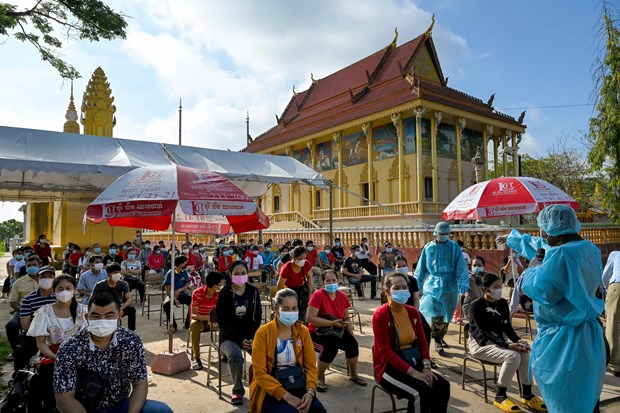Regional countries extends preventative measures to combat COVID-19
The administration of Cambodia's Phnom Penh capital on the evening of October 14 continued extending administrative measures to prevent the spread of COVID-19 from October 15 to 28.
 |
| Illustrative image (Photo: AFP/VNA) |
This decision has dimmed the hopes for reopening of non-essential businesses such as bars and massage parlors, even though Phnom Penh is a city with a high rate of vaccination. Business and occupational activities with a high risk of COVID-19 infection such as cinemas, karaoke bars, nightclubs, and other forms of entertainment continue to be suspended for an additional 14 days. However, the number of people meeting in group increase from 15 to 50 people in some cases.
Cambodian Ministry of Health spokeswoman Youk Sambath said the country's inter-ministerial committee will work out a strategic plan on safely reopening to boost the national economy. This strategy requires people's participation in the implementation of epidemic prevention measures.
The committee is studying the reopening without isolation for fully vaccinated COVID-19 travelers from countries with low risk of COVID-19 infection and will submit this recommendation to the Government in the coming time.
According to Sambath, after the Pchum Ben holiday the number of COVID-19 cases in Cambodia did not increase, possibly due to the effectiveness of the vaccines and the implementation of preventive measures.
On the same day, Indonesian COVID-19 Task Force spokeperson Wiku Adisasmito said the country would maintain the order to limit community activities (PPKM) during the upcoming Christmas and New Year holidays.
At an online press conference on October 14, Adisasmito stated that PPKM will be maintained during the year-end holidays to continue to reduce COVID-19 cases. He also urged people to comply with the government's anti-epidemic measures, and hoped that local authorities would monitor and control travel activities to prevent the spread of the epidemic
According to the official, experience from previous outbreaks shows that COVID-19 cases often increase after the relaxation of social restrictions, but there is a lack of regional adjustment.
Meanwhile, small-scale PPKM is deployed simultaneously in all areas, down to the household cluster and residential group level, has proven effective in reducing COVID-19 cases.
Source: VNA